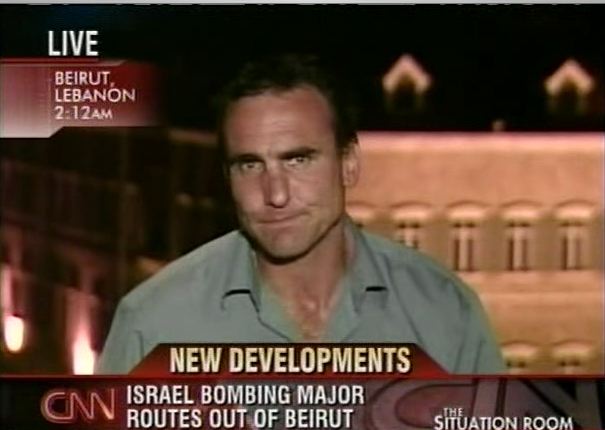TSR: No bombs in Beirut tonight

Click photo to play
Length: 5:52
WOLF BLITZER: Our correspondent Michael Ware is on the scene for us. Michael, the last couple of nights, huge explosions rocking Beirut. So far tonight, quiet, I take it?
MICHAEL WARE, CNN CORRESPONDENT: That's right, Wolf. Although there is a jet fighter above me in the skies as I speak, it has been quiet this evening. So far the last couple of nights if there is a bombardment, we see it commence any time from about now until the first rays of daylight. Last night, if you recall, there was an extremely intense bombardment here on the southern outskirts of Beirut.
As many as 30 bombs dropped within the area of half a square mile, targeting a small district near the airport and with port access. When I went down there this afternoon I saw the damage that was wrought by the attack, an entire fishing fleet wiped out. I suspect this is part of the Israeli Defense Forces attempts to put a strangle hold, a grip, on Lebanon, to prevent any kind of ratlines or secret supply routes -- Wolf.
BLITZER: Do you get an impression that people are now fleeing parts of Beirut that had been relatively stable, Christian quarters, for example, Christian areas, Sunni areas of Beirut as opposed to the largely Shia southern part of the city?
WARE: Well, it's always hard to tell, but there was no obvious signs today that certainly I saw of a mass exodus of any kind. I think by and large the weight of the population that sought to get out of the city and return to family villages or head up into the relatively safe mountain areas controlled by the Druze forces and others have already left, so no, I didn't see a scurrying from the city today -- Wolf.
BLITZER: All right, Michael, we're going to come back to you, Michael Ware on the scene for us in Beirut.
BLITZER: Welcome back. We're following all the latest developments in the Middle East crisis tonight. Let's go right back to Beirut right now, Michael Ware is on the scene for us once again, tonight.
As you look out over this city, the Israelis say they've tried to pinpoint Hezbollah targets specifically in south Beirut, they've tried to go after the most dangerous spots, they say, and if there are some mistakes, there are mistakes. But by and large, they say they're sticking to Hezbollah.
Is that what you're seeing on the ground as you go out and inspect these craters and these other targets of the Israelis?
WARE: Yeah, well, obviously, Wolf, it's very hard to know exactly what's what. I mean, that's the nature of any war, and particularly here, I mean, Hezbollah is very disciplined. Even its foot soldiers are all on message, so -- and supporters, too. People don't give much away, so you go to a bombing scene and you actually are prevented from seeing some things and yet you're allowed to see others. So nothing becomes readily apparent.
Although last night, this heavy concentration of bombings in this southern district, it wasn't one of the areas identified by the Israelis that day where they warned people to get out. It was an area to the side, but it was heavily dominated by Shia people, largely impoverished.
I spoke to some locals, the few who remain. They said we support Hezbollah. We are not fighters, but our heart is with them. So goodness knows what's in there and what's not. It all depends on the nature and the quality of Israeli intelligence -- Wolf.
BLITZER: They're saying, the Israelis also, that are trying to find Hassan Nasrallah, the leader of Hezbollah, and kill him, also one of his deputies, Imad Mugniyah, they would like to find him as well, kill him as well. We see Hassan Nasrallah make these video appearances on Lebanese television, various channels. Does he ever show up on the streets? Does he ever go out or is he simply on the run all the time, knowing he's enemy number one as far as Israel is concerned?
WARE: Yeah, look, Wolf, let me assure you, there's no scenes here in Beirut or elsewhere like, for example, we saw in Iraq as Baghdad was falling and Saddam popped up and made that one last appearance for the cameras on the street. There's nothing like that. Sayid Hassan Nasrallah means business. He's in the business of guerrilla warfare. He's not going to let himself make a mistake like that. He'll be moving constantly. He'll be with a small, tight band of bodyguards. Very few people will have any knowledge of where he is or what he's doing, and to be honest he has the capacity, I suspect, to slip back and forth across the border. So he'll be staying very much under the radar, Wolf.
BLITZER: As a lot of our viewers will remember when you were "Time Magazine's" Baghdad bureau chief, you often times managed to get close to some of the Iraqi insurgents and do some excellent reporting on where they were, what they were doing, what their motivations were, where they were getting their money, where they were getting their weapons. Is there any way that people can do that, reporters can do that with Hezbollah?
WARE: Well, Hezbollah has surrounded themselves with a public relations ring of steel. As I was saying, from the upper echelons to the rank and file in the street, they've closed the doors, slammed them shut. Nonetheless, there's always a way. You can always find some people who are much more approachable than others, so different journalists are attempting to make different inroads. So far, however, as you can tell, no one's yet cracked the nut, so to speak. Wolf.
BLITZER: All right Michael, thanks very much. Michael Ware on the scene for us in Beirut.
